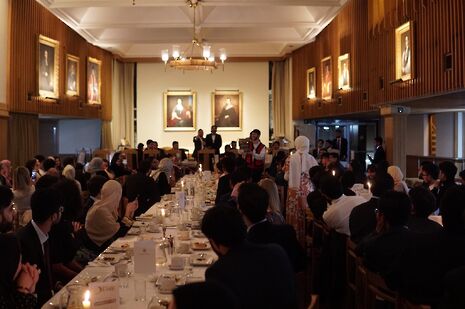Among strangers, finding familiar faces
Maryam Mahmood reflects on how she found a community with Cambridge’s Islamic Society

Cambridge is an overwhelming place for some, and totally normal for others. For me, it was the former. Having grown up in the diverse streets of London, surrounded by people like myself, coming to Cambridge felt like a wakeup call. The kind of call you get in the middle of the night, waking you up from your dream just as you were about to reach the best part. A call to reality, perhaps.
Walking through the streets of Cambridge was a great contrast to the streets at home. Seeing unfamiliar faces wherever I turned created a sense of discomfort, and the conversations I had made me realise how far I was from the familiar.
For the first time, I realised that not everyone shares or even understands my views. Being a Muslim is an integral part of my identity. At home, this was never disputed and an explanation was never demanded from me. But here, within the walls of Cambridge, I found myself having to explain why I don’t drink or why I need to spare ten minutes as the sun is setting down to go pray; things that I've never had to do before. My identity as a Muslim is further complicated as I don’t wear a hijab, a common identifier of Muslim women. Not having my faith apparent has been difficult, as I have too often felt the need to announce that I am a Muslim whenever I am in a new group: to explain who I am, what I believe and why I can’t go to Wednesday Cindies or Friday Fez with them.
Whenever I reveal that I’m Muslim, the response I’m met with is ‘but you don’t look Muslim,’ because I don’t fit into common stereotypes about what Muslim women are supposed to look like. With the hijab, I would be immediately marked out as Muslim, but without it, I am invisible. Once my identity is revealed it becomes open to judgement from people who don’t fully grasp what Islam is. I hold my faith close to me but once it is revealed, it is no longer my own. Instead, it becomes an abstract concept to be discussed using complex academic jargon. The type of Muslim I am becomes the subject of intense political debate.
Being a Muslim woman in a new environment, regardless of whether you wear the hijab or ‘look’ Muslim, is not easy
Being a Muslim woman in a new environment, regardless of whether you wear the hijab or ‘look’ Muslim, is not easy. It’s not easy to have your identity continuously challenged and questioned. University is typically seen as a place where you have the freedom to figure out who you are and what defines you, but unlike everyone else, I came to university already knowing who I was, and what was important to me. I am, first and foremost, a Muslim.
I also came with the high expectations held by many students that I would find a community I could belong to in my college. When this expectation wasn’t met, I was left with the deep ache of loneliness and the fear that there was no community for me here. It wasn’t until I looked outside of college that I found a community which understood me.
I joined the Cambridge University Islamic Society (ISoc) as soon as I arrived here, and being amongst people who understood and embraced my identity was a relief from what was slowly becoming the everyday routine of explaining the origins of my name or the reasons why I choose to follow Islam. There was no judgement, just the unspoken promise of solidarity.
This was more than a student society; it was a community and sanctuary where I could be myself and not have to explain to others what that meant. Here I was comfortable. Here I was welcomed. Here felt like peace.
In the third week of term, ISoc took part in ‘charity week.’ I found the act of giving back rejuvenating. Charity is an important aspect of Islam, so much so that one of the five pillars of the faith is dedicated to it — ‘zakat’. From hiking up Snowdon to hosting bake sales, my contributions (however small) alongside the amazing work of the committee made me feel like I was making a difference. It made me feel like I was part of a community which not only understood who I was as a person, but also helped me strengthen and solidify my sense of self. It was here that I finally owned myself and my identity.
It was the sense of community that I felt at ISoc events and gatherings, the instant friendships I made there, and the feeling of ease that came along with it that fundamentally shaped my time here as a fresher and helped me to adjust to a new environment, rather than the collegiate system which Cambridge emphasises. Everyone around me sought refuge in their colleges, college families, and coursemates, but I found mines at ISoc. The importance of finding a community which will accept you for you who are with no questions asked is understated.
I now feel comfortable in what first felt like such an uncomfortable place. I used to walk through the streets and feel my stomach turning at the sight of faces that were all different to mines. But now, I walk with a newfound sense of courage. I know that amongst those unfamiliar faces, I'll see the occasional ISoc member and, with a smile, we’ll reaffirm our promise of solidarity.
 Features / Pulling pints and making flat whites: the unspoken relationship between hospitality staff and Cambridge students17 June 2025
Features / Pulling pints and making flat whites: the unspoken relationship between hospitality staff and Cambridge students17 June 2025 News / Pembroke alumnus appointed as new head of MI617 June 2025
News / Pembroke alumnus appointed as new head of MI617 June 2025 News / Academics seek to restrict University’s use of injunctions 16 June 2025
News / Academics seek to restrict University’s use of injunctions 16 June 2025 News / 2025: The death of the May Ball? 13 June 2025
News / 2025: The death of the May Ball? 13 June 2025 News / SU overspends for second year in a row18 June 2025
News / SU overspends for second year in a row18 June 2025




